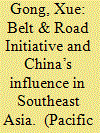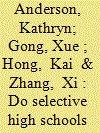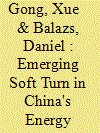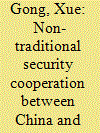|
|
|
Sort Order |
|
|
|
Items / Page
|
|
|
|
|
|
|
| Srl | Item |
| 1 |
ID:
165878


|
|
|
|
|
| Summary/Abstract |
The Belt and Road Initiative (BRI), since its inception in late 2013, has drawn
tremendous global attention. The views of political leaders, business people,
the media, and analysts on the prospect of the BRI are ostensibly polarized.
One group asserts that the BRI will dramatically increase Beijing’s global influence, particularly in China’s neighborhood. Another group surmises that the
BRI is expected to fail because of insurmountable challenges and is expected
to fail. This article joins the debate by exploring the impact of the BRI on
Southeast Asia’s regional order. The author holds a middle-ground position
and argues that the actual impact of the BRI should neither be easily dismissed nor overestimated. More likely, through the BRI, China’s influence in
Southeast Asia will increase but not to the extent of forging a Sinocentric
order in the region. This can be explained by three major factors: (a) the
responses of Association of Southeast Asian Nations (ASEAN) and its member
states toward the BRI, (b) the effects of alternative infrastructure initiatives
proposed by other major powers in Southeast Asia, and (c) China’s questionable ability to deliver its BRI promises.
|
|
|
|
|
|
|
|
|
|
|
|
|
|
|
|
| 2 |
ID:
147618


|
|
|
|
|
| Summary/Abstract |
We use regression discontinuity design to examine the effect of a system of public exam high schools, which admit students solely by pre-existing achievement, on student college entrance exam scores in Beijing, China. More selective exam schools may have higher peer quality and sometimes are equipped with more experienced teachers and better facilities. We find, however, that elite exam high schools, which are the most selective, have no effects on student test scores. We find that on average the system of exam schools improves student performance on the exam, which indicates that students benefit from attending more selective non-elite schools. The results on qualifying for college admission are consistent with our findings about test scores. Differences among schools in peer achievement, student/teacher ratio and the percentage of certificated and experienced teachers partially explain our findings; self-choices of track and exam participation do not explain test scores or college admission.
|
|
|
|
|
|
|
|
|
|
|
|
|
|
|
|
| 3 |
ID:
183798


|
|
|
|
|
| Summary/Abstract |
Energy security has been the paramount concern of Chinese top leaders. Geographically, Southeast Asia holds the key to China's energy security, given its importance to Beijing's seaborne energy trade. Therefore, China's energy cooperation in the region is often analyzed from a hard security perspective. In a departure from these approaches, this paper explores the softer angle of China's effort of strengthening relations with its neighbors and assesses its impact. The soft approach puts a greater emphasis on public good provision such as sustainable development instead of the old method of enhancing energy security through resource trade. The aim of this turn was to bolster trust between China and Southeast Asia, strengthen the foundations of cooperation, and improve Beijing's image in the region. By providing a perspective different from hard security analysis, we shed light on the enabling and constraining factors of China's more active role in regional energy governance.
|
|
|
|
|
|
|
|
|
|
|
|
|
|
|
|
| 4 |
ID:
176237


|
|
|
|
|
| Summary/Abstract |
The ‘free and open Indo-Pacific’ (FOIP) strategy, actively promoted by the United States with support from its allies and partners, is a significant geopolitical response to China's growing power and expanding influence in Asia and beyond. Beijing has adopted various new strategies to cope with the challenges related to FOIP. One of these strategies is to secure a robust relationship with south-east Asia in order to make these regional states either neutral to or less supportive of the Indo-Pacific vision. In addition to economic statecraft and soft power, Beijing believes that it can also tap into the domain of non-traditional security (NTS) to strengthen relations with this region to position itself better in the intensifying regional geopolitical competition. The article addresses the following question: what is the impact of China's NTS cooperation with south-east Asia on Beijing's geopolitical rivalry with other major powers in the Indo-Pacific region? The article argues that China's NTS cooperation with south-east Asian countries may help China maintain its geopolitical standing in the region, but it is unlikely to lead to any dramatic increase of China's strategic influence in the region. This essentially means that Beijing may be able to prevent ASEAN or most ASEAN member states from lending substantive and strong support to the Indo-Pacific construct, but it will not be able to stop ASEAN states from supporting some elements of the FOIP.
|
|
|
|
|
|
|
|
|
|
|
|
|
|
|
|
|
|
|
|
|